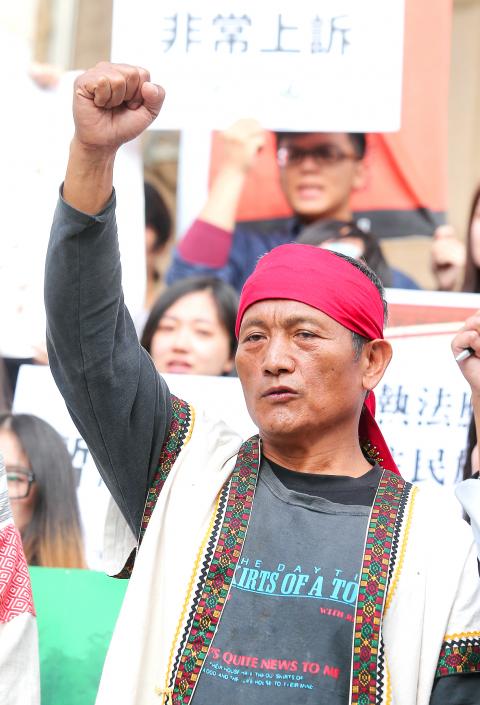Aborigine hunters prosecuted in terms of the Wildlife Conservation Act (野生動物保育法) in 2014 are to file for a constitutional interpretation on the ruling, saying that the ruling conflicted with Article 19 of the Indigenous Peoples Basic Act (原住民族基本法) as well as constitutionally protected rights.
Bunun Aborigne Tama Talum, 56, was sentenced to three-and-a-half years in prison for violating the Wildlife Conservation Act and the Act Governing the Control of Guns, Ammunition and Knives (槍砲彈藥刀械管制條例), for hunting a Formosan Reeve’s muntjac and a goat in 2013 to provide fresh meat for his 94-year-old mother.
Supreme Prosecutors’ Office Prosecutor-General Yen Ta-ho (顏大和) filed an extraordinary appeal against a jail sentence on grounds of suspected discrimination against Aboriginal culture in December last year.

Photo: CNA
Talum and lawyers on Friday last week filed an 80-page application for a constitutional interpretation.
Puyuma Aborigine Pan Chih-chiang (潘志強), who was arrested on similar charges, said in tears that they hoped Aborigines’ mandate to continue their hunting culture would be placed on an equal footing with the conservation of the culture of the Han people.
Talum said that hunting was intricately tied to the life of an Aborigine and has been a constant, even under Japanese colonial rule, adding that they hoped the result of the constitutional interpretation would allow their people to hunt openly without fear of slander and recrimination.
Lawyer Wen Chih-jung (文志榮) said that Article 21 of the Wildlife Conservation Act states that necessary hunting by Aborigines due to traditional culture or for rites should not fall under the regulation of the act.
The ruling against Talum was due to the judge’s interpretation that the hunt was carried out for personal reasons and was not a cultural or ceremonial act, Wen said, adding that Article 19 of the Indigenous Peoples Basic Act states that hunting is permitted for all three occasions as long as it is not conducted for profit.
Deputy Minister of the Council of Indigenous Peoples Tunkan Tansikian said the council hopes that the results of the interpretation would help conserve Aboriginal culture without overt violation of ecological conservation.
Tansikian said Taiwan could consider methods used by other nations that cap the number of animals allowed to be hunted, with hunters reporting catches so a government agency can keep track of changes to the wildlife population, adding that bans could be imposed if set limits are not adhered to.
Forestry Bureau Deputy Director-General Yang Hung-chih (楊宏志) said the government had offered to enact the same plan, but it was turned down by Aboriginal rights groups, who believe that the spoils of a hunt are granted by their ancestors.

Alain Robert, known as the "French Spider-Man," praised Alex Honnold as exceptionally well-prepared after the US climber completed a free solo ascent of Taipei 101 yesterday. Robert said Honnold's ascent of the 508m-tall skyscraper in just more than one-and-a-half hours without using safety ropes or equipment was a remarkable achievement. "This is my life," he said in an interview conducted in French, adding that he liked the feeling of being "on the edge of danger." The 63-year-old Frenchman climbed Taipei 101 using ropes in December 2004, taking about four hours to reach the top. On a one-to-10 scale of difficulty, Robert said Taipei 101

Nipah virus infection is to be officially listed as a category 5 notifiable infectious disease in Taiwan in March, while clinical treatment guidelines are being formulated, the Centers for Disease Control (CDC) said yesterday. With Nipah infections being reported in other countries and considering its relatively high fatality rate, the centers on Jan. 16 announced that it would be listed as a notifiable infectious disease to bolster the nation’s systematic early warning system and increase public awareness, the CDC said. Bangladesh reported four fatal cases last year in separate districts, with three linked to raw date palm sap consumption, CDC Epidemic Intelligence

Two Taiwanese prosecutors were questioned by Chinese security personnel at their hotel during a trip to China’s Henan Province this month, the Mainland Affairs Council (MAC) said yesterday. The officers had personal information on the prosecutors, including “when they were assigned to their posts, their work locations and job titles,” MAC Deputy Minister and spokesman Liang Wen-chieh (梁文傑) said. On top of asking about their agencies and positions, the officers also questioned the prosecutors about the Cross-Strait Joint Crime-Fighting and Judicial Mutual Assistance Agreement, a pact that serves as the framework for Taiwan-China cooperation on combating crime and providing judicial assistance, Liang

US climber Alex Honnold left Taiwan this morning a day after completing a free-solo ascent of Taipei 101, a feat that drew cheers from onlookers and gained widespread international attention. Honnold yesterday scaled the 101-story skyscraper without a rope or safety harness. The climb — the highest urban free-solo ascent ever attempted — took just more than 90 minutes and was streamed live on Netflix. It was covered by major international news outlets including CNN, the New York Times, the Guardian and the Wall Street Journal. As Honnold prepared to leave Taiwan today, he attracted a crowd when he and his wife, Sanni,